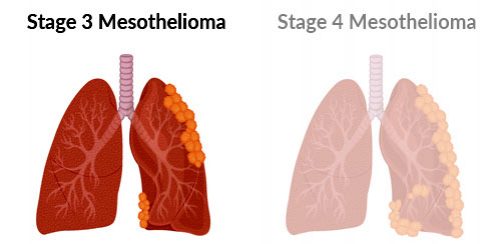Stage 3 Mesothelioma
Stage 3 mesothelioma is the most common stage of diagnosis. The progression to stage 3 mesothelioma is marked by the growth of tumors into multiple tissues and possibly into vital organs. Stage 3 mesothelioma symptoms include chest or abdominal pain, fatigue and weight loss. Patients in stage 3 live an average of 18 months with surgery.
What Is Stage 3 Mesothelioma?
The development from stage 2 to stage 3 means the mesothelioma cancer is no longer considered in an early stage and has now advanced.
Tumor growth remains localized to tissues near the site of origin in the pleura (lining of the lungs), but cancer cells may have metastasized into more lymph nodes and organs within the region.
Surgery may still be an option at this stage depending on the extensiveness of lymph node and organ involvement. Prognosis is considered favorable compared to stage 4.
In stage 3, cancer has not yet spread to distant tissues and organs, but tumor growth may be compromising the heart, lungs, diaphragm and other vital tissues.
Characteristics of Stage 3 Mesothelioma
Most doctors use the American Joint Committee on Cancer’s TNM classification system, which stands for Tumor Node Metastasis, to stage pleural mesothelioma.

- Stage 3A: Mesothelioma has grown into deeper tissues of the chest wall and heart sac, known as the pericardium. Surgical removal is difficult but possible. The tumor remains confined to one side of the chest wall within the pleura and may also be present in the mediastinum between the lungs or the breathing muscle, known as the diaphragm.
- Stage 3B: Tumors have grown too far to be completely removed with surgery. Cancer has grown into the pleura, diaphragm and mediastinum on one side of the body. Mesothelioma may also have progressed into the ribs, heart, spine, esophagus or the lining of the abdomen, known as the peritoneum.
No distant metastasis has occurred in stage 3. Surgery is not usually an option for patients with stage 3B mesothelioma, and chemotherapy is the treatment of choice.
Mesothelioma pioneer Dr. David Sugarbaker created another system known as the Brigham Staging System, which outlines the role of surgery in each stage. However, the majority of doctors still prefer using the TNM staging system.
Currently, there is no formal staging system for peritoneal mesothelioma. However, the disease is sometimes considered to be stage 3 if there is advanced tumor growth in the chest wall and abdomen.
Stage 3 Mesothelioma Causes
Asbestos exposure is the primary cause of mesothelioma. Asbestos fibers are long and thin crystalline particles that can become trapped in the lining of the lungs or other areas of the body through inhalation or digestion. These fibers get released into the air or water when asbestos-containing materials begin to degrade.
Over time, these fibers trigger an immune response that causes inflammation and scarring in the tissues, damaging DNA and leading to unregulated cellular replication and cancer.

Stage 3 Mesothelioma Symptoms
Compared to stage 1 and stage 2 mesothelioma, major symptoms are more present in stage 3. These symptoms may be severe, and diagnosis occurs more frequently than in the early stages.
Signs of Stage 3 Mesothelioma
- Persistent cough
- Nausea, fatigue or weight loss
- Moderate chest or abdominal pain
- Moderate difficulty breathing
As tumors develop, pleural effusion may cause fluid accumulation between the layers of the pleura and lead to excess pressure on the lungs. However, this is more common in stage 4 mesothelioma.
More advanced stage 3 peritoneal mesothelioma may present with gastrointestinal distress, and late-stage pericardial mesothelioma symptoms include irregular heart rhythms.
Prognosis for Stage 3 Mesothelioma
A mesothelioma diagnosis at stage 3 has a two-year survival rate between 26% and 38%. Tumor-removing surgery is still possible but conducted mainly to reduce symptoms.
Life expectancy in this stage is largely dependent on the patient’s response to treatment and available therapies. Surgery may not be successful if there is extensive lymph node involvement.
With a successful response to surgery and post-surgical therapies, roughly 38% of patients diagnosed with stage 3 mesothelioma have a life expectancy of at least five years. This number decreases to about 7% in stage 4 mesothelioma.
Cancer that has more thoroughly invaded the lymph system has greater access to the bloodstream and a higher risk of metastasizing to distant organs.
On average, patients with a larger number of affected lymph nodes survive for about 13 months, while those with minor lymph node involvement typically have a mesothelioma life expectancy of more than two years.
- Age
- Gender
- Cancer cell type
- Treatment response
- Overall health
The availability of treatment options at the time of diagnosis will affect a patient’s prognosis and life expectancy for stage 3 mesothelioma.
Is There a Cure for Stage 3 Mesothelioma?
There is currently no cure for any stage of mesothelioma, but most treatments in stage 3 aim to shrink tumors, prevent cancer growth or decrease the severity of symptoms.
In certain cases, patients may be candidates for more aggressive treatments, but these procedures aren’t intended to cure the disease.
Ongoing advancements are opening up new opportunities in treatment options, providing a positive outlook for stage 3 mesothelioma patients.
Some mesothelioma survivors respond especially well to these treatments or other therapies offered through clinical research trials, and they survive for several years beyond their life expectancies.

Stage 3 Mesothelioma Treatment Options
Surgery
Stage 3 pleural mesothelioma patients may be eligible for extrapleural pneumonectomy or pleurectomy with decortication. Mesothelioma treatment options will depend on how far cancer has spread.
Extrapleural pneumonectomy is an aggressive surgery that removes the entire affected lung, linings of the heart and lungs, affected lymph nodes and a portion of the diaphragm.
Pleurectomy and decortication is a less aggressive alternative that removes the pleural lining of the lungs along with any visible tumors. The surface of the lung is then scraped to remove the remaining cancer cells, and the lung is left intact.
Chemotherapy
Chemotherapy is often used in combination with surgery to treat stage 3 mesothelioma.
Pemetrexed (Alimta) is used in combination with cisplatin as the most effective first-line treatment for mesothelioma and can be delivered before, during or after surgery.
The hyperthermic intraperitoneal chemotherapy (HIPEC) procedure for stage 3 peritoneal mesothelioma involves washing the abdominal cavity with a heated chemotherapy solution.
Radiation
Radiation therapy uses high-energy beams to kill cancer cells in a specific and discrete location while minimizing damage to neighboring healthy tissue.
This therapy can be applied before surgery to shrink tumors before removal or after surgery to prevent local recurrence.
Palliative Care
Palliative care is intended for patients who may not tolerate more aggressive surgical procedures. These therapies aim to improve the quality of life and increase overall function.
Treatments such as palliative chemotherapy and radiation can help you feel better and extend survival by reducing cancer-associated pain. A thoracentesis is a surgical option that drains fluid buildup around the lungs to improve breathing effort.
Complementary Treatment
Complementary therapies may also improve overall health and empower the immune system to fight cancer. Therapies, such as yoga and acupuncture, complement conventional chemotherapy and other cancer regimens.
These practices offer patients more control over their treatment plans and provide a wider range of options. Lifestyle changes, such as improved diet and exercise, can also increase overall health and prolong survival.
Many patients seek help from support groups and loved ones. Support networks provide motivation and help patients advocate for their care.
Clinical Trials
Clinical research trials afford one of the best chances at increased survival for stage 3 mesothelioma patients. New methods of treatment for advanced-stage cancer are constantly being researched.
These studies allow patients the opportunity for otherwise unavailable and potentially effective therapies such as immunotherapy, gene therapy and new chemotherapy options.
While therapies offered in clinical trials are not yet approved by the FDA, results have shown exciting promise for the future of mesothelioma survivability.



